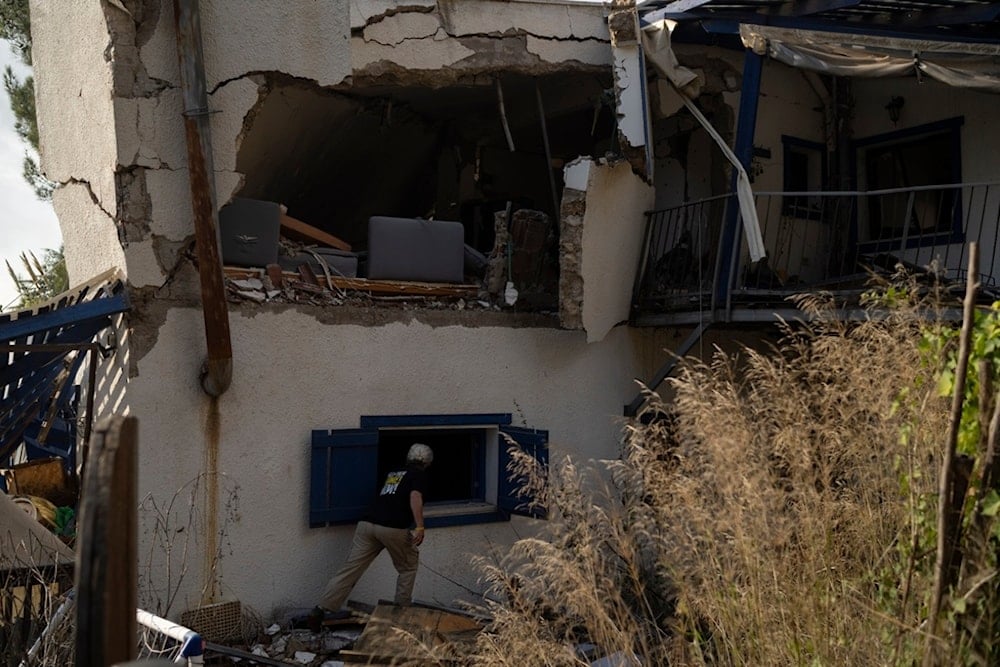Israeli ministers set date for northern settlers' return, vow benefits
The truce agreement with Lebanon includes a 60-day timeline, raising doubts about long-term security and stability in the region.
-

A settler checks a damaged house that was hit by a rocket fired from Lebanon, in the Kibbutz Manara, northern occupied Palestine, Thursday, November 28, 2024. (AP)
Israeli Finance Minister Bezalel Smotrich and MK Ze'ev Elkin on Sunday announced that March 1 had been designated as the target date for northern settlers to return to their settlements, following months of fleeing due to the recent war on Lebanon.
The announcement, made during a press conference, comes amid growing concerns about the state of the North and its readiness to welcome back its settlers.
The return is coupled with a series of financial benefits to be offered to northern settlers who return.
According to the two ministers, the program depends on security assessments, which, according to them, may change. Current assessments are that settlers may begin their return in March.
"The key to returning home is security and we are not going to compromise on this matter," said Finance Minister Bezalel Smotrich. "Residents of the North are returning to a different security reality, and we will make sure that quiet is maintained for years."
Smotrich did not elaborate but said that Israelis should wait "15 days", which is the date US Trump takes office, in order to understand what these assessments were based on. Smotrich hinted that Israeli occupation forces may remain in South Lebanon despite "Israel’s" commitment to remove its troops by January 27 as part of the 60-day truce agreement with Hezbollah.
According to the compensation plan, northern settlers who return to their settlements starting in March will receive grants of NIS 25,360 per adult and NIS 12,680 per child.
Evacuated settlers will be entitled to two separate grants. The first will assist with their return to their settlements and the second is intended to compensate returnees for the damage caused to their housing units that was not compensated by property tax authorities.
Challenges to return
Meanwhile, Israeli media have highlighted significant hurdles to resettlement. A survey published on Friday by the initiative "Heading North" revealed that 93% of young Israelis displaced during the war have no plans to return, citing fear and uncertainty about the post-ceasefire period.
The truce agreement with Lebanon includes a 60-day timeline, raising doubts about long-term security and stability in the region.
The damages to northern settlements are staggering, with direct costs estimated at 5 billion shekels and indirect damages reaching up to 4 billion shekels. Thousands of housing units, factories, and public infrastructure were heavily damaged, alongside critical systems like electricity and water.
Read more: 'Blood of northern settlers on Netanyahu's hands,' Israelis cry
Ceasefire agreement under fire
Former Israeli Navy commander Major General Eliezer "Chayni" Marom criticized the ceasefire, suggesting it was rushed under US pressure and left "Israel" at a disadvantage. He argued that the agreement should have focused on enforcing UN Resolution 1701, which calls for a buffer zone to limit Hezbollah's movement.
Marom stated, "We agreed to a bad agreement, which sets timelines for the Israeli army's withdrawal from Lebanon" and warned of the challenges this poses for ensuring long-term security in the North.
Settler distrust, uncertainty
Many settlers express a lack of confidence in the IOF's ability to secure the North. Israeli Channel 12 reported that settlers are hesitant to return due to the extensive damage and Hezbollah's ongoing presence in southern Lebanon.
A political commentator on Kan Channel noted the absence of a buffer zone in the agreement, arguing that it is essential for the safety of settlers.
Read more: Settlers won't immediately return to the North: Israeli media
The situation remains dire for northern communities, as both logistical challenges and security concerns hinder efforts to resettle the area.

 4 Min Read
4 Min Read








